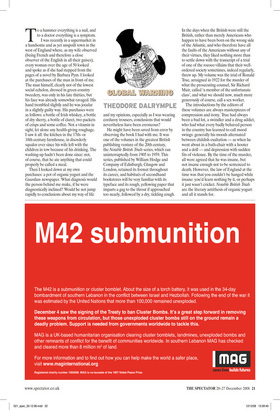global warning THEODORE DALRYMPLE
To a hammer everything is a nail, and to a doctor everything is a symptom. I was recently in a supermarket in a handsome and as yet unspoilt town in the west of England where, as my wife observed (being French and therefore a close observer of the English in all their guises), every woman over the age of 50 looked and spoke as if she had stepped from the pages of a novel by Barbara Pym. I looked at the purchases of the man in front of me. The man himself, clearly not of the lowest social echelon, dressed in green country tweedery, was only in his late thirties, but his face was already somewhat ravaged. His hand trembled slightly and he was jocular in a slightly guilty way. His purchases were as follows: a bottle of Irish whiskey, a bottle of dry sherry, a bottle of claret, two packets of crisps and some coffee. Not a vitamin in sight, let alone any health-giving roughage. I saw it all: the kitchen in the 17thor 18th-century farmhouse, in disorderly squalor ever since his wife left with the children in tow because of his drinking. The washing-up hadn’t been done since: not, of course, that he ate anything that could properly be called a meal.
Then I looked down at my own purchases: a pot of organic yogurt and the Guardian newspaper. What diagnosis would the person behind me make, if he were diagnostically inclined? Would he not jump rapidly to conclusions about my way of life and my opinions, especially as I was wearing corduroy trousers, conclusions that would nevertheless have been erroneous?
He might have been saved from error by observing the book I had with me. It was one of the volumes in the greatest British publishing venture of the 20th century, the Notable British Trials series, which ran uninterruptedly from 1905 to 1959. This series, published by William Hodge and Company of Edinburgh, Glasgow and London, retained its format throughout its career, and habitués of secondhand bookstores will be very familiar with its typeface and its rough, yellowing paper that imparts a gag to the throat if approached too nearly, followed by a dry, tickling cough. In the days when the British were still the British, rather than merely Americans who happen to have been born on the wrong side of the Atlantic, and who therefore have all the faults of the Americans without any of their virtues, they liked nothing more than to settle down with the transcript of a trial of one of the rococo villains that their wellordered society sometimes, indeed regularly, threw up. My volume was the trial of Ronald True, arraigned in 1922 for the murder of what the prosecuting counsel, Sir Richard Muir, called ‘a member of the unfortunate class’, and what we should now, much more generously of course, call a sex worker.
The introductions by the editors of these volumes are always masterpieces of compression and irony. True had always been a bad lot, a swindler and a drug addict, who had what every badly behaved person in the country has learned to call mood swings: generally his moods alternated between childish exaltation — as when he went about in a bath-chair with a hooter and a doll — and depression with sudden fits of violence. By the time of the murder, all were agreed that he was insane, but not insane enough not to be sentenced to death. However, the law of England at the time was that you couldn’t be hanged while insane: you’d learn nothing by it, or perhaps it just wasn’t cricket. Notable British Trials are the literary antithesis of organic yogurt and all it stands for.






















































































































 Previous page
Previous page